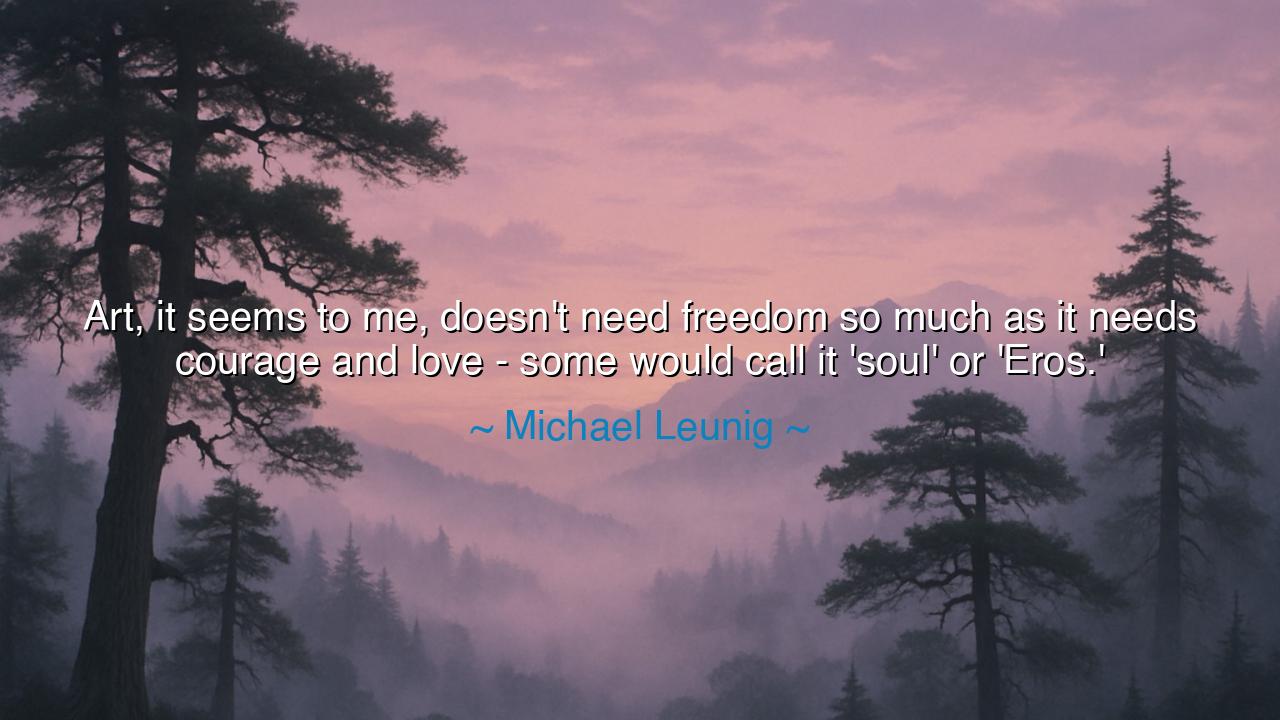
Art, it seems to me, doesn't need freedom so much as it needs
Art, it seems to me, doesn't need freedom so much as it needs courage and love - some would call it 'soul' or 'Eros.'






“Art, it seems to me, doesn’t need freedom so much as it needs courage and love — some would call it ‘soul’ or ‘Eros.’” — thus spoke Michael Leunig, the gentle prophet of pen and ink, whose humor conceals holiness and whose simplicity hides deep truth. In these few words lies a teaching that reaches far beyond brush and canvas, into the heart of creation itself. For Leunig tells us that art is not born from liberty alone, but from the courage to feel, the love to reveal, and the soul to endure. Freedom may open the door, but only Eros, that divine longing which binds beauty and sorrow, can make the artist walk through it.
The origin of Leunig’s insight comes from his own life as a poet, cartoonist, and spiritual wanderer. He lived in a time when art was often mistaken for rebellion — when many believed that to be an artist was simply to be free from rule, to defy structure, to reject authority. Yet Leunig saw a deeper truth: that freedom alone does not create beauty. One can be free, yet hollow; liberated, yet lifeless. What art truly requires is the courage to feel deeply, even when feeling hurts, and the love to share that feeling with the world. For art is not an act of defiance, but an act of devotion. It demands not the breaking of chains, but the opening of the heart.
Courage, as Leunig names it, is the strength to face the unknown — to look upon the darkness within oneself and not turn away. Every artist, in truth, stands before a silent abyss each time they create. They risk failure, rejection, misunderstanding. Yet without this risk, no art can live. The ancients knew this: Michelangelo, chiseling his David from the marble, once said that the statue already existed within the stone — he merely had to set it free. But to free it, he had to strike. Each blow of the hammer was an act of courage — a willingness to destroy in order to reveal. So it is with every act of creation: it is born not from safety, but from daring.
Yet courage alone is not enough. The flame must be tempered by love. Love gives warmth to courage, transforming defiance into tenderness. Without love, the artist becomes only a technician, producing beauty without meaning, sound without song. But with love, every brushstroke, every word, every note carries life. Consider Vincent van Gogh, who painted not for fame or money but from an overflowing heart. Though haunted by madness and poverty, he painted the wheat fields and the stars with such reverence that even today his work seems to pulse with living light. His art was not born of freedom, for he was often confined by his own mind — it was born of soul, the Eros that Leunig speaks of, that sacred passion which unites love, suffering, and truth into beauty.
When Leunig speaks of ‘Eros,’ he does not mean mere desire, but that divine force that draws all things toward life and connection. The ancient Greeks believed Eros to be the god of creative harmony — the pulse that moves the heavens and awakens the heart. In this sense, Eros is the very soul of art, the longing to unite the seen and the unseen, to give form to the invisible. Every true artist, knowingly or not, serves this power. They do not create for themselves, but for the mysterious joy of creation itself. Their art becomes a bridge between worlds — between mind and heart, between man and the eternal.
This, then, is the wisdom of Leunig’s words: that freedom may give art its wings, but courage and love give it flight. Many who are free never dare to create; many who live in constraint produce works of transcendent beauty. It is not circumstance that shapes art, but spirit. The artist must be brave enough to be vulnerable, and loving enough to give what they have found to others. For every stroke of creation is both a confession and a gift — an offering of the soul’s truth to the altar of the world.
Therefore, dear listener, if you wish to create — whether in art, in work, or in life itself — do not wait for perfect freedom. Begin where you stand. Take courage into your heart and love into your hands. Let your work come not from calculation, but from soul, from the living Eros that stirs within you. When fear whispers, “You are not enough,” answer it with tenderness: “I will create anyway.” For that is the essence of Leunig’s teaching — that creation is an act of faith, not of control; of courage, not of comfort; of love, not of license.
And in this way, as the ancients would say, your art will not merely imitate life — it will breathe it. For every true act of creation, born of courage and love, is a spark of the divine made visible.






AAdministratorAdministrator
Welcome, honored guests. Please leave a comment, we will respond soon